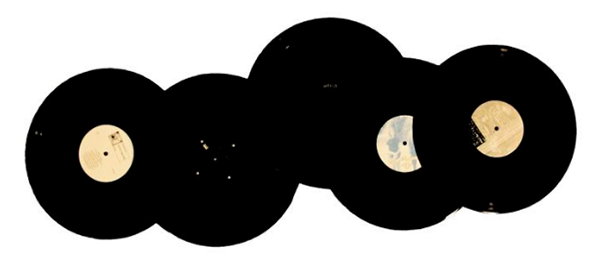The survival of vinyl records
By Charles Purnell Jan. 24, 2010

Photo by Christa Connelly / Daily Titan Photo Editor
Music industry insiders made a prediction in 1989 that vinyl records would soon be extinct.
The foresight was partially true because record companies stopped producing 45s (vinyl singles) in early 1990. The reason: buying behavior of music patrons had changed. Cassettes and compact discs proved far more appealing than the flat, black circles with only two songs on them.
As it turned out, LPs (long players in industry jargon) maintained appeal with DJs throughout the decade of cassettes and compact discs.
With the emergence of DJ software like Serato in 2001 another prediction was made: LPs would soon be extinct because digital vinyl could be used to play MP3s. Furthermore, turntables were going to be tossed to the wayside because digital turntables allowing DJs to scratch and back cue CDs were underway.
Music industry specialists were wrong again. Vinyl LPs survived the digital era and are still being produced by record companies and sold around the world.
>Chris Cervantes, 28, of Fat Beats Records in LA, a music retail store that caters to consumers of vinyl records, says that music industry insiders three times announced predictions that vinyl would become extinct. However, according to Cervantes, no other media can compare to vinyl. When you buy an album or single, for example, the record's jacket is like a poster. Plus, listeners can manipulate vinyl in ways they can't with a CD or any other media.
"Nobody's going to give that up," he said.
There are three reasons why LPs have managed to survive the past 20 years: Some people prefer the warm analog sound of vinyl; some DJs haven't crossed over to digital DJing because they are intimidated by the technology - either it's too expensive or they prefer to dig in the crates so to preserve that element of DJ culture; and some people simply own only analog turntables.
People like listening to music as it is being distorted. For some, the smooth, silky and noisy sound of vinyl is preferred over the shiny, bright and detailed sound of CDs and other digital media.
John Robinson, 55, who works in Mr. C's Records in Downtown Orange said he has customers ranging from ages 9 to 30 who buy vinyl regularly. He said they like the clicks, pops and hisses.
"Vinyl has a wider dynamic range than, let say CDs," Cervantes says. "If you looked at a CD’s sound-waves on paper they would all be the same size, the same range, and that makes up this compressed sound. But if you look at a sheet of paper with vinyl's sound-waves they would be up and down - all over the place - different ranges giving you a fatter sound."
No digital media, including digital vinyl, comes close to reproducing the warm, full and airy sound of vinyl. Accordingly, vinyl will be around for many more years.
DJ Lime Green, from Orange County, is a professional DJ who continues to buy vinyl. He admits to crossing over to digital DJing but he prefers to dig in the crates for the perfect song to cue. According to DJ Lime Green, digging in the crates is the essence of being a DJ and one reason DJs continue buying vinyl.
"I still rock vinyl at hip-hop shows in conjunction with Serato," he said.
And then there are the DJs who just aren't Internet savvy.
Depending solely on a computer to store and playback music is risky because hard drives crash. DJs buy vinyl these days to back up their MP3 playlists in case something goes wrong with their hard drives.
In addition to backing up hard drives some DJs purchase vinyl because they don't want to pay for, or can't afford, digital DJ software which ranges in price from $299.99 to $699.99.
Cervantes said one reason why people are sticking with vinyl records over digital vinyl is because there is latency from where the needle is on the digital vinyl and the playback of the MP3. The latency can throw a DJ offbeat, especially when he or she is scratching.
Although there is latency involved when playing vinyl records, everything is still in real time.
Lastly, there are people in this world who own turntables and enjoy playing back vinyl records. Companies such as Sony and Vestax still produce record players. Vestax record players have a built in speaker, eliminating the need for an amplifier.
Cervantes says there is still a market for vinyl records as long as they are packaged properly and come out on time.
Sales of vinyl records comprise 80 percent of gross sales in Fat Beats Records.
DJ Lime Green said major labels are only pressing vinyl records that are guaranteed to sell, and most singles come out on vinyl after the single is played-out. Lime Green said, "Swagga Like Us" by rappers T.I. and Jay-Z came out on vinyl six month late.
"Vinyl will never die 100 percent," he said. "All the wax that comes out in super low quantities over the next few years will become collector items."
According to Cervantes, there are enough die-hard vinyl users to keep vinyl records alive. He also predicts a backlash effect in the realm of digital DJing. Newer DJs are going to look at other DJs and wonder why they are using digital vinyl when regular vinyl is better for mixing. And then new-school DJs are going to stick with vinyl records to out-due the digital DJs.
DJ Lime Green has a similar prediction.
"I think in a few years people are going to wake up or there's going to be a whole new generation that is going to see all the old-school stuff and be like 'forget these new school cats playing music off their laptops.' We need to take it back," he said. "And I think it will be considered cool to play records again."